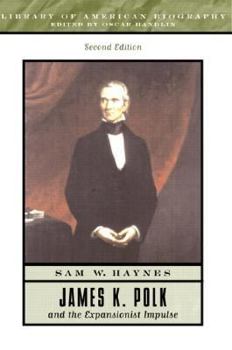James K. Polk and the Expansionist Impulse
(Part of the Library of American Biography Series and Library of American Biography Series)
Select Format
Select Condition 
Book Overview
This biography explores the controversies, triumphs, and failures of the presidency of James K. Polk. Sam W. Haynes places Polk's expansionist agenda in both political and social contexts and examines... This description may be from another edition of this product.
Format:Paperback
Language:English
ISBN:0321087984
ISBN13:9780321087980
Release Date:August 2001
Publisher:Longman Publishing Group
Length:232 Pages
Weight:0.15 lbs.
Dimensions:0.5" x 5.1" x 7.9"
Customer Reviews
4 ratings
James K. Polk
Published by Thriftbooks.com User , 16 years ago
11 James K. Polk - 1845-49 Polk is our most underrated president. He championed the idea of manifest destiny. He believed the United States was destined to own all the land from the Atlantic to the Pacific. Texas was annexed, and the Mexican War was fought. The treaty added California, Nevada, Arizona, New Mexico, Wyoming, Idaho, Oregon and Washington. The U.S. stretched from sea to shining sea. Polk was from Tennessee. He accomplished what he wanted and decided not to seek a second term. I rank him #6.
Good summary of Polk's political career
Published by Thriftbooks.com User , 19 years ago
James K. Polk has one of the most interesting historical reputations among American presidents. Serving for a solitary term, he consistently ranks among the most highly regarded occupants of the White House. Yet in spite of this he has been the subject of surprisingly little attention from historians. This is what makes Sam Haynes' short study so welcome. Seeing Polk as representative of the nation's desire for territorial expansion, he provides a concise account of the life of this understudied figure. Haynes' book is hardly the final word on Polk; he compresses the first thirty years of Polk's life into a single chapter, raising many questions that are then left unanswered. It is only when Polk emerges as one of Andrew Jackson's lieutenants in the House of Representatives that the narrative slows enough to allow for insights. Haynes sees Polk as the "consummate Jacksonian," serving as a loyal lieutenant and emerging as one of the foremost heirs to his legacy. Yet two successive defeats in races for the governorship of Tennessee dimmed his political star, and his name was not among those of the frontrunners for the Democratic presidential nomination in 1844. Nonetheless, Polk emerged from a deadlocked convention as the first "dark horse" nominee in American history. Hynes argues that the significance of the 1844 presidential convention lies in the embrace of territorial expansion as an issue that united a broad range of groups in a diverse country, which helped Polk defeat Henry Clay in the subsequent election. As president, Polk was a hands-on manager who carefully monitored every department of the executive branch. While viable with the small bureaucracy in the Washington of his day, this proved impractical when managing the far-flung war against Mexico. The Mexican-American War takes up over a third of the book, both as the pivotal event of Polk's presidency and as the culminating moment of the expansionist movement. Haynes depicts it as a natural consequence of the belligerency of American expansion, which risked war with Great Britain as well over the Pacific Northwest. Polk's battles were not confined to foreign relations, though, as going to war with poorly defined aims exacerbated tensions between the proslavery South and antislavery North. Polk also clashed with the predominantly Whig military commanders, who chafed at the president's effort to micromanage the conflict. This created conflict as well with Polk's handpicked negotiator, Nicholas Trist, who succeeded in hammering out a treaty ending the war before the expected recall order arrived. His success allowed the president to step down with the war as the crowning achievement of his administration, though Polk was so exhausted that he died soon afterwards. Haynes's book provides an excellent introduction to both American expansionism during the 1840s and Polk's conduct of the war. In many respects, it serves as a useful supplement to Charles Sellers's unfinished
James K. and the Expansionist Impulse
Published by Thriftbooks.com User , 20 years ago
James K. Polk and the Expansionist Impulse is an exciting and educational book. It helps to understand American history especially the policies pursued between 1845 and 1849 as well as the polities of that time but more importantly it enlightens the reader on the life of American's 11th president who added 522 million acres to land of the country. The book also confirmed the accusation that Americans think they are superior and have the ability to do anything at all better than the rest of the world. This is evident in the way Mexico was treated. Convinced that they were the only people with the requisite qualities for self-government, they looked down on the Mexicans and took away their lands. One can now perfectly understands why Mexicans harbor so much bitterness towards Americans even up to today. This book will be of a great benefit to any student studying American history and anyone at all who is interested in learning about President Polk and the lands he coveted for his country.
Polk Put Simply
Published by Thriftbooks.com User , 23 years ago
While many people try to depict the lives of our past Presidents in four or five hundred pages, this abbreviated view of the life and associations of James K. Polk is a refreshing change. As a history major, this book provides all of the pertinent information required to gain an insightful depiction of this man. It is a must read for anyone interested in Jacksonian America and an entertaining read for thinkers from all walks of life.





